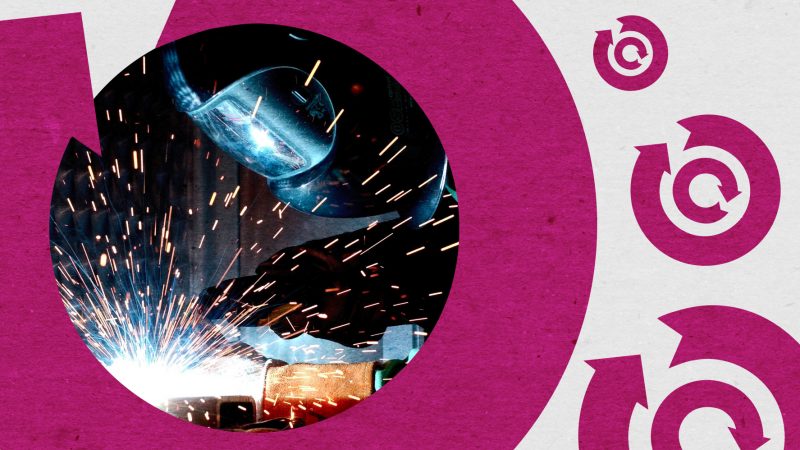
The past six months have been extremely difficult for our country and our economy. We are now officially in a recession and with a 20% GDP contraction in the second quarter the UK economy is amongst the hardest hit in the world. There’s no doubt that mistakes have been made and lessons must be learnt – one of the most important being that our economy’s over-reliance on the service sector is dangerous and must be addressed.
Our country desperately needs a renaissance of manufacturing, with the stability and prosperity and enormous capacity for innovation that the sector can bring. To release the full potential of manufacturing, this government needs to urgently develop a comprehensive industrial strategy to address decades of decline and neglect under successive governments.
The foundation of that industrial strategy must be a strong and sustainable steel industry. If Global Britain is going to compete on the world stage in the years ahead, we must look at the evidence. The most successful economies in the world are all built on the back of a strong steel sector supporting advanced manufacturing supply chains. Moreover, the pandemic has clearly demonstrated the dangers of relying on fragile international supply chains for materials essential to our economic and national security.
As it has for other sectors, Covid-19 has placed our steel industry under massive pressure. We know our industry faces major challenges but there are also huge opportunities, which can safeguard the future of steel and our industrial base with the right framework of government support.
The government has pledged to ‘Build Build Build’. This must mean building with Britain’s steel and extracting maximum benefit from government contracts to support jobs and communities the length and breadth of the country. The already-announced investment in infrastructure was welcome, but the programme must be hugely expanded to kick start our economy and give business the confidence it needs to move forward.
The fact is that whether we are building roads, railways, schools or hospitals, a national infrastructure programme is going to require many millions of tonnes of high-quality domestically produced steel. Historically 50% of the steel requirement for government projects has been met by imports – this needs to change, and as Britain exits the EU now is the time to get procurement policy right so that UK taxpayers’ money supports UK jobs and industrial communities.
HS2 is a crucial test for this government. We know that UK producers can make more than 90% of the HS2 requirement for two million tonnes of steel. Boris Johnson recently promised that UK steelmakers will be at the front of the queue for government contracts – and he must be held to his word.
A green steel industry will also be vital to delivering our climate change objectives. Our industry is committed to net zero and here there are opportunities to become a world leader in the development and export of low-carbon technologies. The government has already announced hundreds of millions to help steelmakers transition to low-carbon production, and that support must be accelerated and expanded.
Central to a green industrial strategy for steel should be an acknowledgement that Britain needs to retain its primary steelmaking capacity (making steel from raw materials) alongside its secondary steelmaking capacity (making steel from recycled metals). The primary blast furnace-based steelmaking route is currently the only way to make certain strategic steels for the automotive industry, as well as for food packaging, so either we make those steels ourselves or we import them. It’s clear that over the long term, global steel demand is increasing and so the world’s steel requirements are not going to be met through recycling alone. Someone is going to have to be making steel, and that someone should be us – leading the world at the cutting edge of low-carbon steelmaking.
Delivering a transition to low-carbon primary steelmaking will require huge investment in those businesses, and it will also require a huge R&D commitment from government to develop the technology and build the necessary infrastructure. As a priority, government must commit to investing in hydrogen technologies, which have the potential to green not only our steel industry but our entire economy, and fully explore the potential of carbon capture and storage.
The present is tough but the future can be bright if seized. Our steel industry has huge advantages: we have the most committed highly-skilled workforce there is, we have a valuable domestic market and the chance to be at the centre of efforts to rebuild our economy, and we have the opportunity to lead the world in a responsible transition to low carbon steelmaking. The sector will play its part, but it is crucial that government steps up to support and invest in the industry and the development of new technologies.
Britain needs its steel. Steel is everywhere and fundamental to our economy and way of life. It is part of our proud industrial heritage but most importantly it is vital to our economic future. Recent events have reinforced the need to rebalance our economy, and vibrant manufacturing supply chains supported by a strong and secure steel industry are essential to that objective. The future is there to be taken, and I would urge everyone reading this piece to back the campaign to support a great British industry. Britain, we need our steel.




More from LabourList
‘Council Tax shouldn’t punish those who have the least or those we owe the most’
Two-thirds of Labour members say government has made too many policy U-turns, poll reveals
‘Two states, one future: five steps on the path to peace for Israelis and Palestinians’